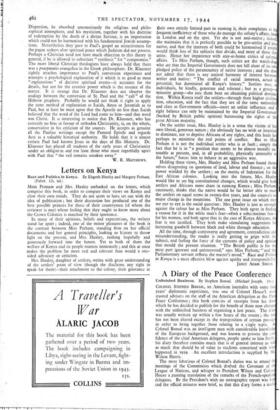Letters on Kenya
Race and Politics in Kenya. By Elspeth Huxley and Margery Perham. (Faber. 12s. 6d.)
Miss PERHAM and Mrs. Huxley embarked on the letters, which comprise this book, in order to compare their views on Kenya and clear their own minds. They do not seem to have set out with the idea of publication ; but their discussion has produced one of the best possible primers for those of their countrymen (of whom the reviewer is one) whose feeling that they ought to know more about the Crown Colonies is matched by their ignorance.
In many of their opinions, beliefs and expectations, the writers stand far apart ; indeed, one of the minor pleasures of the book is the contrast between Miss Perham, standing firm on her official documents and her general principles, looking to history to throw light on the present, and Mrs. Huxley, rushing hopefully and generously forward into the future. Yet to both of them the welfare of Kenya and its people matters immensely ; and this at once makes the problem far more real and relevant than would a one- sided advocacy or criticism. Mrs. Huxley, daughter of settlers, writes with great understanding of the settlers' point of view (though she disclaims any right to speak for them)—their attachment to the colony, their grievance at
their own strictly limited part in running it, their complaints at frequent inefficiency of those who do manage the colony's affairs, bo in London and on the spot. Yet she is not anti-native ; inde she maintains that it is perfectly possible to be pro-settler and pr native, and that the interests of both could be harmonised if people would think less of the subjects that divide, and more of those tha unite. Hence her impatience with stay-at-home critics of colon affairs. To Miss Perham, though, such critics are the watch-d who see that the Imperial Government does not fall short of its o pledged policy of the paramountcy of native interests ; and she does not admit that there is any natural harmony of interest between settler and native: " The conflict of racial interests, actual o potential, has dominated all Kenya's history." Settlers may, a individuals, be kindly, generous and tolerant ; but as a group— minority group—she sees them bent on obtaining political domina tion. Within Kenya itself the settlers—through their higher civilisa tion, education, and the fact that they are of the same nationalit and class as Government officials—exert an unfair influence, and right balance can only be maintained by the Imperial Government (backed by British public opinion) buttressing the rights of the great African majority.
On the settler issue, Mrs. Huxley is in a sense the victim of ho own liberal, generous nature; obviously has no wish or intentio to dominate, nor to deprive fricans of any rights, and this leads he perhaps to minimise the real points of conflict. But to Mis Perham it is not the individual settler who is at fault ; simply th fact that he is in " a position that seems to be almost morally un- tenable at present, and, in all probability, physically untenable the future," forces him to behave in an aggressive way.
Holding these views, Mrs. Huxley and Miss Perham found them selves disagreeing on questions of land, labour and finance ; on th power wielded by the settlers ; on the merits of federation for th East African colonies. Looking into the future, Mrs. Husk would like to see big constitutional changes, which would give bo settlers and Africans more share in running Kenya ; Miss Perham cautiously, thinks that the native would be far better able to me the settlers on equal terms in twenty-five years, and she counsels n major change in the meantime. The one great issue on which the see eye to eye is the social question: Mrs. Huxley is just as strong) against the colour bar as Miss Perham. They both agree in findin a reason for it in the white man's fear—often a subccnscious fear for his women, and both agree that in the case of Kenya Africans, th fear is not justified. They both make stimulating suggestions fo increasing goodwill between black and white through education.
All the time, through controversy and agreement, contradiction and misunderstanding, the reader is really getting to grips with the subject, and feeling the force of the currents of policy and opinio that mould the present situation. "'Me British public is for th most part ignorant and uninterested," says Miss Perham; " and th Parliamentary servant reflects the master's mood." Race and Politic in Kenya is a most effective blow against apathy and irresponsibility.
JANET ADAM SMITH.


























 Previous page
Previous page